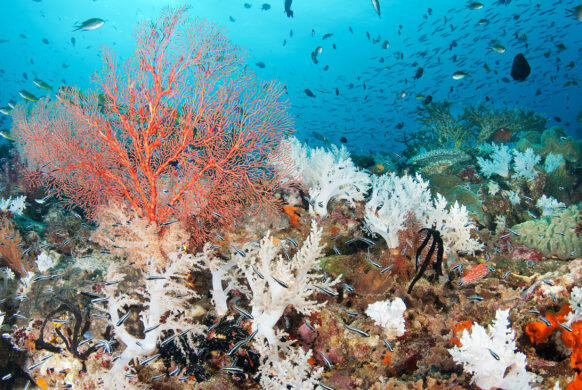Have we humans reached a point where we destroy our environment and contribute in climate change, then try to find ways to re-create what was lost? Why is it so anyway?
Have we become so careless that we take it to the limits regarding squandering resources and killing endangered animals, and harming marine life… then trying to get back all that was lost in this “destructive” process?
Corals are being destroyed due to “coral bleaching”. Now how is this related to climate change?…
Since climate change is causing ocean water to become warmer, coral bleaching is more likely to happen.
When water is too warm, corals will expel the algae (zooxanthellae) living in their tissues causing the coral to turn completely white. This is called coral bleaching.
Ruth Gates, a researcher, wanted to discover why some coral animals survive coral bleaching. She went to Moku o Loʻe (Coconut Island), the site of the University of Hawaii’s state-of-the-art marine laboratory, with her team, to learn why this phenomenon is happening.
What will the scientists do next? Try to fix “man-made” destruction of marine life and marine organisms by introducing “climate-adapted” super coral to the ocean, to help bring the “dying” coral reefs back to life.
This urgency led Gates to team up with marine ecologist Madeleine van Oppen in Australia on a five-year project, funded by Microsoft co-founder Paul Allen (whose company Vulcan supports projects to promote ocean health and conservation), to engage in “human-assisted evolution,” Newsweek mentioned.
The idea of breeding coral, as one would wheat or tomatoes, has sparked controversy.
So Gates assured a well-heeled audience at the Punahou School in Honolulu that “This is not [genetically modified organisms], people!”
The challenge is to discover the biological mechanisms that allow some corals to fare better than others. The University of Hawaii team will be sequencing the genomes of the five main coral species in the bay to pinpoint the genes that best equip corals for the rigors of climate change. But another big factor, Gates says, is the nature of the symbiosis between the wormlike coral polyp and a photosynthesizing algae the polyps depend on for food.
We should mention that:
- Coral reefs are dying around the world
- There is a significant human impact on coral reefs
Serious Threats to these eco-systems include:
- Coral mining
- pollution (organic and non-organic)
- Overfishing
- Blast fishing
- Digging of canals
- Access into islands and bays
As mentioned above, the serious threats to these eco-systems are man-made. So why not stop the “destructive” actions instead of spending our time “reviving the dead”?











